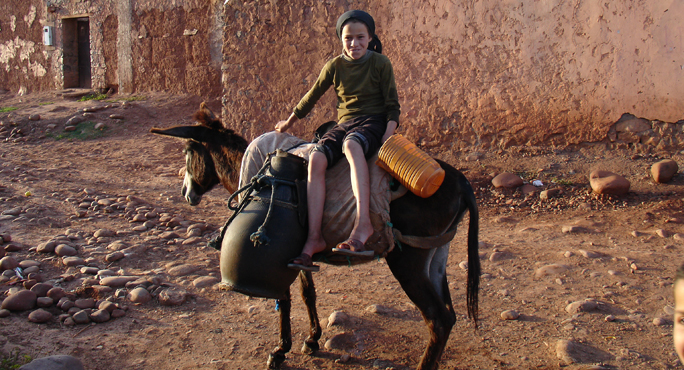Girl On A Donkey, Morocco. Photo by: Chris Kilham © 2009
Dear readers – even as you peruse this article, I am in the North African country of Morocco, in the ancient city of Marrakech. I am attending a conference called IFEAT (International Federation of Essential Oils and Aroma Trades). I was asked to attend and speak at this conference by my largest client, Naturex, for whom I do a lot of plant exploration around the globe. Naturex buys herbs in huge quantities, and then makes extracts of those herbs, for use in the food, nutraceutical, cosmetic and beverage markets. I help to identify and establish trade in medicinal plants around the world that eventually become such extracts.
The primary purpose of this conference is to bring together people who work with plant-derived aromas. Many attendees are suppliers of essential oils like eucalyptus, geraniuam, rosemary, thyme, iris and dozens more. I’ve spotted friends and colleagues from South Africa, the UK, Egypt, and the US. They all work with medicinal and aromatic plants. The natural fragrance sector is dynamic and fluid, and this conference brings people together to share information, swap ideas, set up business ventures, and have as many productive meetings as possible. I spoke at the conference this morning about hunting for botanicals in Morocco, and showed a number of photos from my trip a few years ago to the Atlas Mountains of Morocco to see the wild harvesting of many aromatic and medicinal herbs, including rosemary and thyme. The former is powerfully protective and is of special benefit to the liver, and the latter is an exceptional remedy for sore throat, cough and bronchitis. I also spoke of a future for Nigella sativa, also known as black cumin.
Nigella was spoken of by the prophet Mohammed in this way, “this black cumin is healing for all diseases except death.” Its reputation appears well deserved. According to a good body of science, Nigella contains antioxidant and anti-inflammatory compounds, it demonstrates anti-cancer activity, it is naturally antibiotic, it protects and heals the liver, it helps to regulate blood sugar, and it shows benefits for the heart by reducing blood lipids. In Morocco, this is one of the true super-medicines. I am hoping that Nigella will become better known, that companies will reach out to use this medicine, and that a traditional remedy from the arid Moroccan desert can be embraced globally. Wandering the markets of Marrakech I have spotted a number of displays of this black cumin seed.
Not far from my hotel is the famous Jamma Al Fna, the gigantic marketplace in the center of Marrakech. Overlooking its vast central square is the imposing tower of the famous Koutoubia Mosque. Jamma Al Fna has it all, from jugglers and tumblers to snake handlers (cobras and big, fat vipers), orange juice vendors, carts groaning with dried fruits and nuts. At night a couple hundred restaurants on wheels roll into the Jamma Al Fna, and before you can say cous-cous, there are dozens of cooking fires going, and foods of every description, from shrimps to chicken to sheep heads, to simple and delicious local round breads that taste like no others.
My self-appointed task in the market has been to take some photos, talk with a few herbal shop owners, and just take in the colorful surroundings. Off of Jamma Al Fna’s central square, the old markets go on for a long, long way. In Pharmacy Azzahra, dozens of bottles filled with ground herbal powders line the walls. A young man named Abdul tells me that a lot of people come in to get herbs for the liver and for digestion. At Herboriste Sahara, Abdellah tells me that the traditional plant-based remedies are still sought after, and highly effective.
Traditional remedies like Nigella sativa and the many others I see in the market, become increasingly well understood as more science is applied to them. In this way we learn about the compounds in plants, what these substances do in the body, and what doses work. At this conference in Marrakech, many talented people engage in exactly those activities. So there is a wealth of talent here. Also, we have the cultural riches of Morocco all around us. This Moroccan excursion is one way that I stay connected with different parts of the global herbal trade. It helps me to better understand what is happening around the world. Happy trails!


